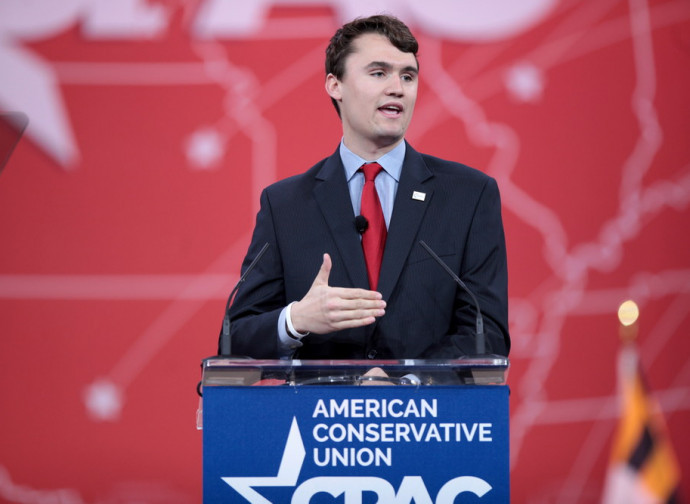Kirk's message was based on the principle of universal natural law
Charlie Kirk was not Catholic, but evangelical. For him, at least formally, there was no Social Doctrine of the Church, however, he had returned to a belief in natural law, albeit with evangelical overtones.

The murder of Charlie Kirk has touched everyone. In recent days, many observations and reflections have been made on the matter, alongside the spiritual closeness to his wife and children in the face of dismay. This tragedy will not be forgotten anytime soon, and its many applications to so many areas of life today will exert a significant influence on thinking. For our part, we will offer a few considerations from the perspective of the Social Doctrine of the Church.
While most condemnations of the incident focus on the violation of freedom of expression and the demands of liberal democracy, many observers and commentators see Kirk as the champion of this freedom. Many observers and commentators regard Kirk as a champion of freedom of expression, a man with the courage to speak his mind and discuss his ideas with everyone in public debates such as the one he was holding at the time of the shooting. However, this interpretation does not consider the content, i.e. what he said and the principles he promoted and defended. Of course, freedom is a substance as well as a form, but when it is taken so generically and understood only as the freedom to speak one's mind in public, it becomes reductive and ambiguous.
The same applies to those who view Kirk's social and political action as a faithful and honest expression of the 'American dream'. Here, too, we need to pause before delving into the content. Anyone wishing to analyse in light of the Social Doctrine of the Church should not stop there because both democratic freedom of expression and the American dream need to be grounded. Instead, we must ask whether Kirk's message was intended to be based on a more solid foundation.
Some argue that his views on current social and political issues varied in quality and did not all merit the same level of appreciation. While this may be true, the so-called 'non-negotiable principles', although interpreted personally, were all present. He campaigned against the termination of innocent human life through state abortion, advocated for the traditional family unit, sought to provide children with a quality education, opposed current post-natural ideologies such as gender and woke ideologies, and highlighted the potential destabilising effects of immigration, particularly Islamic immigration, on nations. Therefore, we can conclude that he was not merely advocating for democratic freedom or the American dream, but rather aiming to establish fundamental principles rooted in natural law. This most convincingly connects him with the Social Doctrine of the Church.
However, Charlie Kirk was not a Catholic, but an evangelical. For him, at least formally, there was no Social Doctrine of the Church, due to the lack of magisterial authority to formulate it, as well as the different relationship between political reason and religious faith for evangelicals compared to Catholics. In this regard, several solutions can be derived from Protestantism: a completely secular state or a state that governs the public dimension of religious life. The faithful may believe that their conscience legitimises any choice in the public sphere or that Jesus Christ wants them to be consistent in this area as well.
As far as we know, Charlie Kirk had returned to a belief in natural law, which was still expressed with evangelical overtones but was solid because it was based on common sense. The points he insisted on were quite simple and accessible to all, and he defended them with rational arguments rather than arguments of faith. He asked his interlocutors to point out where he was wrong. In this respect, his commitment seems consistent with the Social Doctrine of the Church.
Linked to this is the public role he assigned to the Christian faith and God. In this area, too, his attitudes remain evangelical rather than Catholic because, for him, the teachings of Jesus take precedence over those of the Church. However, it should be noted that the Social Doctrine of the Church also recognises the public role of the Christian religion and that, in the fight against atheistic religious indifferentism, the primacy of God in the world must be prioritised as a condition for everything else.
In the flood of news about him that has spread in recent days, an indication of his possible approach to the Catholic religion has also emerged. Some of his statements about Mary Most Holy have been reported, and, together with his friendship with numerous Catholics involved in public life, these could indicate his inner disposition.
However, this raises the question: would today's Catholic Church approve of Charlie Kirk's commitment? Regardless of the new course opened by Leo XIV, and speaking generally, one could have many doubts about the appreciation of his message, starting with some American bishops. On issues such as life, family, homosexuality, gender, assisted suicide, immigration and environmentalism, many influential voices in the Catholic Church today oppose the ideas promoted by Charlie. They are even more at odds with his method, which is considered too militant by all accounts. He did engage in dialogue, as today's Catholic clerics claim to do, but he did so with the intention of letting the true ideas win against the false ones.
